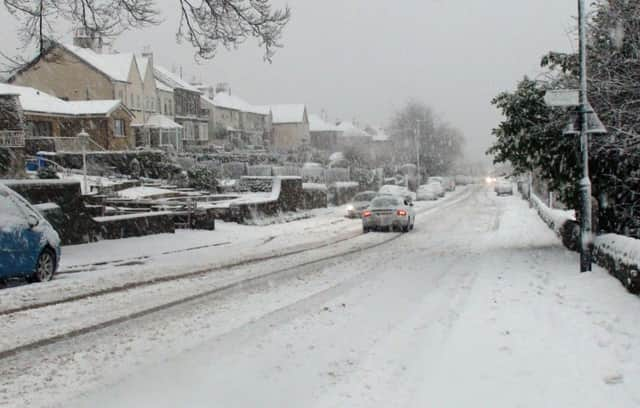Winter comes roaring back - but where will it strike?


AS I sit here writing this, looking out across Leeds towards the railway station from The Yorkshire Post’s offices, clouds zip across the sky punctured by streaks of watery sunlight.
Half an hour earlier it was raining and then it started snowing. It’s one of those blustery days where the weather can’t decide what it’s doing – but that’s winter for you.
Advertisement
Hide AdAdvertisement
Hide AdYou’d think we might be used to it by now, but then the weather has long been a national obsession, so the suggestion in recent days that a “displaced polar vortex” is heading our way has, not surprisingly, caused a flurry of excitable headlines. It sounds like some kind of unpleasant sporting injury, but is in fact a meteorological term used to describe the large-scale low pressure area situated above the Poles in the stratosphere.
The long and short of this is that the mercury is set to nosedive yet again. In fact this latest cold front will already have arrived by the time you read this, bringing with it snow, icy conditions and the usual traffic disruption. Or it might not, depending on where you happen to live. And herein lies the rub – the weather in Britain can be very hard to predict.
The Met Office issued a yellow “be aware” warning yesterday for large parts of England, from the North-West to East Anglia, with temperatures expected to drop down to minus 10C last night and up to 8cm of snow predicted to fall over parts of Yorkshire.
This cold snap is likely to continue into next week, although experts say we shouldn’t experience an impact from the heavy blizzards that hit large swathes of the north-eastern coast of the US this week. But even in New York, where they have harsher winters than we do, meteorologists have come under fire with the US National Weather Service (NWS) having to admit its forecasts were wrong, after predicting a “potentially historic blizzard” would strike the city.
Advertisement
Hide AdAdvertisement
Hide AdUp to three feet of snow had been predicted and the subway system was shut down for the first time in its history.
But in the end less than 10in fell (the record is 26.9in) and New Yorkers were left asking what happened to “snowmageddon”? The city’s mayor, Bill de Blasio, was forced to respond to claims that officials overreacted by saying it was better to be safe than sorry.
But if the experts can get it wrong over there, where there are fewer variables to influence the weather, then perhaps we should have a bit more sympathy for our own forecasters who often come in for a fair amount of stick.
Our climate in the UK is influenced by fast-flowing air currents like the jet stream, as well as weather systems from the Atlantic, Arctic and the North Sea all of which are constantly changing and competing with one another.
Advertisement
Hide AdAdvertisement
Hide AdDr Ian Rotherham, professor of environmental geography at Sheffield Hallam University, says this latest cold snap highlights the uncertainty facing forecasters. “Some people are saying it could remain bad for the next two weeks, but the weather has an uncanny ability to do the opposite to what you expect.
“In Europe they deal with it and in North America they know what’s coming, but we don’t. We could invest in major snow-clearing equipment but it could be 15 years before we need to use it, or it could be tomorrow. That’s the joy of the British weather.”
He says the media doesn’t always help matters. “Certain newspapers over-egg the cake and make it seem like the end of the world, when it’s just a bit of snow.”
But predicting the weather can be a thankless task. “We all try to do our best, we look at the major air movements like the Jet Stream, but they only have to change a bit and the prognosis changes completely.”